|
One Hundred
Tamils of the 20th Century
Sivaji Ganesan - Nadigar
Thilakam
1 October 1928 - 21 July 2001
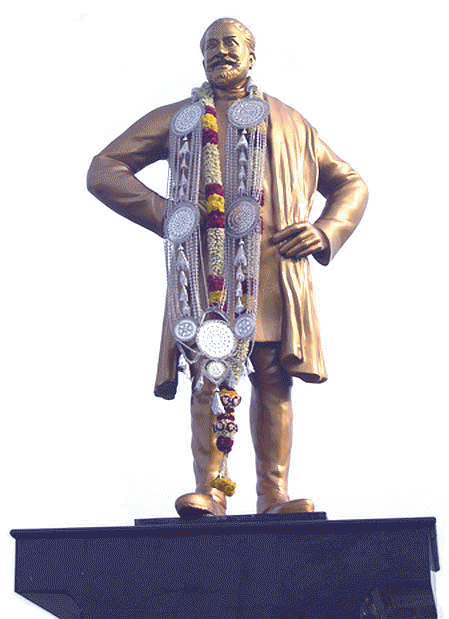
Sivaji Statute in Marina,
Chennai unveiled on 21 July 2006
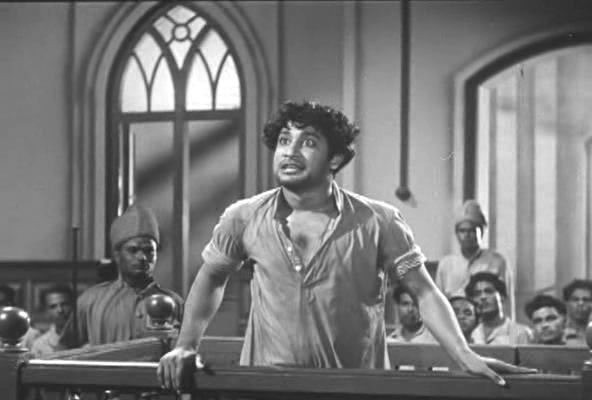
Parasakthi - Sivaji Ganesan's
First Film, 1952
A Lesson in Gratitude from
the Movie Maestro Sivaji Ganesan
by
Sachi Sri Kantha, 20 December
2005...
It is always enchanting and
heart-warming to read and listen to real life
events, which are educational at any time to
individuals of all age ranges.
In this spirit, towards the end of
the year, I provide the following two anecdotes
from the life of Tamil movie legend, Sivaji Ganesan
(1928-2001). In these two anecdotes, Sivaji Ganesan
had taught to many, what is gratitude and why it
deserves recognition and popularisation.
The first anecdote was from a
memoir book about the Tamil movie world which I
read recently, It was authored by distinguished
Tamil movie script writer Aroordhas, who had known
personally and professionally Sivaji Ganesan for
decades.
The second anecdote was oral
history I heard in Colombo three decades ago from
one of my music mentors,violinist Vannai
G.Shanmuganantham.
Both anecdotes have a few
inter-linking threads. The oral story I heard
around 1975 neatly gelled with the written story
which I read recently.
Sivaji Ganesan and his tutor
K.D.Santhanam [written story]
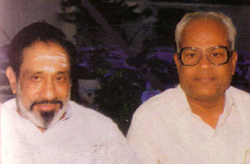
Sivaji with
Aroordhas |
Renowned script writer and director
Aroordhas (born 1931) has a five decade track
record in Tamil movie history. His stage name
Aroordhas is a clipped version of his full village
cum personal name of Tiruvaroor Aarokiyadhas. His
memoir book, Naan Muham Paartha Cinema Kannadigal
[The Cinema Mirrors I have Looked At; Kalaignan
Publishers, Chennai, 2002, 224 pages] carries a
delightful collection of anecdotes on the
personalities who moved the movie world of South
India. I was rather touched by a reminiscence
provided by Aroordhas on Sivaji Ganesan in section
18 of the book (pages 109-113). I provide my
English translation of this entire section
below.
�The Madurai
Mangala Bala Gaana Sabha was a drama troupe managed
by Ethaartham Ponnusami Pillai of Thiruvathavoor,
Madurai. This troupe stationed themselves in
Tiruchi and conducted dramas at the Thevar
Hall.
From Sangili Aanda Puram, a boy
aged 6 or 7 had joined this drama troupe with his
friend, a neighbor�s son. In this
drama troupe, there was a Tamil tutor (Vaathiaar)
who taught drama and Tamil to the young charges. He
was short in stature and was extremely strict. With
or without sense, this tutor punished his young
charges by cane beating, even for smallest errors.
Because of this, the young boys had their bowel
leaks, when they saw or even dreamt about this
extreme disciplinarian cum tutor. In their dreams,
he appeared like a charging lion.
But that Tamil tutor had a great
gift. He could compose beautiful, rhyming Tamil
songs based on poetic grammar. One day, at the
stage, that boy from Sangili Aanda Puram was acting
in the role of a young widow. And by carelessness
on that day, he was wearing a blouse. This had been
noticed by that disciplinatrian tutor.
In that era, wearing blouse by
widows was rather inappropriate according to
societal norms. At the end of the scene, that Tamil
tutor harshly gave a cane beating to that young
boy; �Can�t you
be so careless and unrealistic in your
profession?� was the complaint
against that young boy.
Guess who was that young charge,
who received such a beating? Maestro Sivaji
Ganesan. Who was that cane-loving tutor? My most
respectful and admired elder and great poet,
K.D.Santhanam (S).
43 years ago, during the shooting
of the movie �Pasa
Malar�, I met elder K.D.S. at the
old Neptune Studio and paid my respects. In that
movie, when Sivaji Ganesan (the hero) becomes rich,
he is met by a character named
�Rajaratnam�.
KD.Santhanam played that character.
That young charge V.C.Ganesan never
forgot about, in his illustrious career, from whom
he received the cane-beating and from whose beating
he learnt the alphabets of acting and Tamil
diction. It was he, after establishing his fame in
the movie world, who recommended his harsh
disciplinarian tutor for that particular character
in his great movie.
During the shooting days, Sivaji
would be seated outdoors near the shooting floor
with crossed legs and be in conversation with me,
while having a cigarette in his lips. Then, elder
K.D.Santhanam would occasionally pass us from the
make-up room towards the shooting floor. At the
instant when Sivaji sees his old tutor, he would
dutifully stand up in respect, and hide the
cigarette behind his back. Though noticing that
homage silently, the old tutor K.D.S. pretend
ignoring us and with bowed head pass us
quietly.
It would touch my heart, when
watching that simple, elegant and meaningful
respect Sivaji paid for his old tutor. What a
class! What a grateful
prot�g�! I
mention this anecdote because the younger
generation should be informed of this humility and
gratitude shown by maestro Sivaji.
Once, after K.D.S. had passed us
and went beyond the listening distance, Sivaji sat
back and told me: �Aarooran! On
this Santhanam tutor (Santhana Vaathi) who passed
us. The amount of beating I got from him
isn�t a few. During dance training
(when a step is missed for a beat), during dialogue
training (when a word is missed), he beat us
severely! Oh Mother �
He�d chase and chase us and beat
us! Even when he went to the toilet, he carried his
cane. Now he is passing us like a young girl with
head turned towards the floor. Even when I thought
about him in those days, I�d
shiver.�
I asked him jokingly:
�Then, why did you recommend him
for this role?�
[Sivaji said] �You
don�t know. Because of those
beatings I received from his hand,
I�m now sitting comfortably like
this as Sivaji Ganesan. When I joined the drama
troupe, I was a zero. From him only, I learnt how
to speak dialogue and how to act. Do you know, what
a classy Tamil poet he is? What a poetic touch he
carried in his hands? The songs he wrote for the
Ambikapathi [1957] movie I acted: Ah! What sweet
Tamil, and what lilting rhythm! I tolerated all
those beatings because of his blessed Tamil
knowledge. Otherwise, I�d have
quit the troupe and ran back to my home during any
one of those nights.�
Later, when elder K.D.S. was alone
at the shooting floor, I approached him and
politely mused;
�Elder Sir,
I�ve heard that you gave severe
beating to Sivaji Annan in his young
days.�
[K.D.S.] �Oh! He
has told you about that. Oh! That was in those
days. Now I�m becoming senile. I
cannot remember your script now. Not only that,
when Thambi Ganesan stand in front of me,
shouldn�t I look at his face and
deliver my dialogue? When I look at him now,
I�m getting nervous! Because of
that, can you prepare me for my dialogue by
repeating your script not once but four times? It
may be a bother. Kindly
oblige.�
How Time did change? The same great
tutor who taught dialogue to Sivaji Ganesan in his
young days, with disciplinary cane at his hand, now
he feels nervous to stand in front of his
illustrious
prot�g�, and ask
me to prepare him well for a scene in which he
faces his
prot�g�.�
When I read these pages from
Aroordhas�s book, I was touched by
three inter-twined elements;
(1) a thankful
prot�g�s devotion
to an extremely strict, but sincere, mentor,
(2) repayment of intellectual debt
by an esteemed
prot�g�, and
(3) the mentor�s
heart-felt pride on the grade made by his
prot�g�.
What Sivaji Ganesan said of the
touching poetic feel of his mentor K.D.Santhanam
was no exaggeration. The 16 lines of that one sweet
melody in the Ambikapathi [a historical love yarn
set in the 12th century Chola Kingdom, along the
lines of the more popular Romeo-Juliet story]
movie, beginning with the lines
�Kannile Iruppathenna Kanni Ila
Maane� and sung by P.Bhanumathi as
well as T.M.Soundararajan were from the fertile
mind of K.D.Santhanam.
Sivaji Ganesan and his boyhood
pal E.Subbiah
Pillai [oral story]
Around the time [in 1961 or 1962]
when his signature movie Pasa Malar was released,
Sivaji Ganesan visited Colombo. I heard the
following story from my mentor Vannai
G.Shanmuganantham, around 1975, who was an
eye-witness.
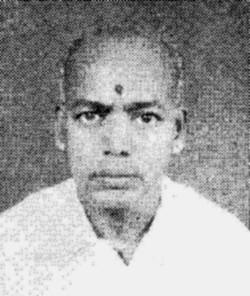
E.Subbiah
Pillai |
At a cultural function held at the
Saraswathie Hall, Bambalapitiya, Sivaji Ganesan was
the guest of honor. With his roving eye, he had a
glance at the orchestra performing at the side of
the stage. During intermission, he rushed to the
orchestra team and stood in front of the
clarinetist E.Subbiah Pillai, who was calm and
composed. With stretched hands, Sivaji greeted him,
�Neenga Subbiah Annan
ille� [Aren�t you
Subbiah elder?]. The clarinetist softly responded
in the affirmative. Then, Sivaji immediately hugged
his long-lost boyhood pal, and was overcome with
emotion. The words fumbled from his mouth.
�Anne! Suhama
irukeengala? Eppavo, Ceylonukku oodi poonatha
sonnanga. Athukappuram, oru sethiyum
kiddaikale.� [Brother, are you
keeping fine? Those days, I heard that you have run
to Ceylon. After that, I didn�t
hear any news about you.]
Then only it became known to the
fellow members of that orchestra team that Sivaji
Ganesan [a junior] and Subbiah Pillai [a senior]
were boyhood pals in a boys drama troupe, and one
day [partly because of the disciplinary tactics of
their tutors and partly because of the lure
provided by a sea-crossing trip to Ceylon], Subbiah
Pillai had moved to Ceylon without announcing his
decision to his then clique. Thus, the pals became
separated.
In the intervening 25 years or so,
while Sivaji Ganesan became a famous movie star in
Chennai, Subbiah Pillai established himself as a
clarinetist in the Radio Ceylon artiste. Subbiah
Pillai, as a senior to Sivaji Ganesan, might have
taught a few
�steps� in the
art world then, to the talented rookie. Sivaji
never forgot the face of his senior.
I personally knew Subbiah Pillai
�Master� in the
late 1960s and early 1970s. In fact, for my flute
debut performance [Arangetram] held on December 3,
1971, at the Bambalapitiya Sammangodu Vinayagar
Temple, my mentor T.P.Jesudas honored him by
requesting him to �keep the Talam
[rhythm keeper]� in front of
me.
Then, after I entered the
university, due to demands on time, I lost much
contact with those older generation of musicians.
One day [before I heard this Sivaji Ganesan
anecdote from violinist Shanmuganantham Master] I
received the news with shock that Subbiah Pillai
�Master� had died
in Jaffna hospital, following a medical misa
dve200re a00er an operation. Even now, I get a lump
in my throat when I think about the calm and
composed Subbiah Pillai Master � a
senior to Sivaji Ganesean of old drama troupe days
- who was the only clarinetist I knew in Colombo in
those days.
|
...from Sri Lanka Tamil Daily
'Thinakaran',
11 November 1972 - on Death of Subbiah
Pillai
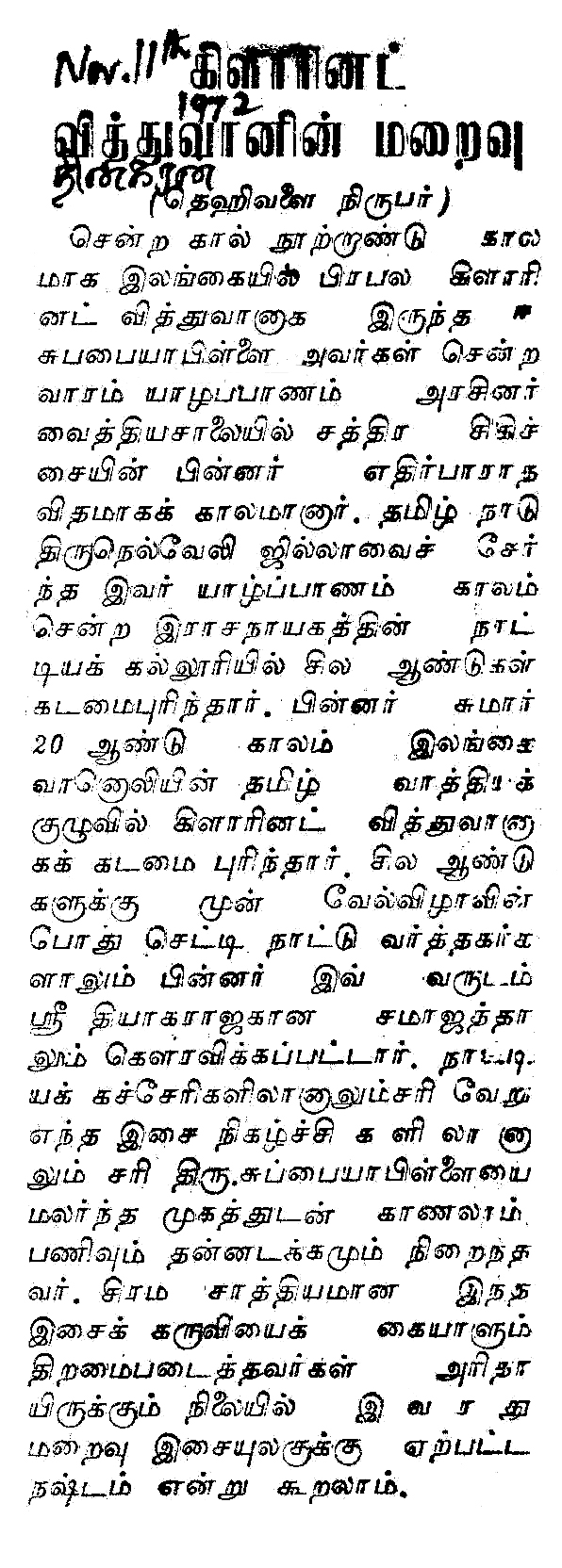
|
|
 Sivaji Ganesan: Autobiography of An
Actor. Compiled and edited by T.S.Narayana
Swamy (in Tamil), English translation by Sabita
Radhakrishna; Sivaji Prabhu Charities Trust,
Chennai, 2007, 250 pp. Book Review by Sachi Sri Kantha, 11 November
2008
Sivaji Ganesan: Autobiography of An
Actor. Compiled and edited by T.S.Narayana
Swamy (in Tamil), English translation by Sabita
Radhakrishna; Sivaji Prabhu Charities Trust,
Chennai, 2007, 250 pp. Book Review by Sachi Sri Kantha, 11 November
2008
Brando and
Ganesan
Marlon Brando (1924-2004) in
USA and Sivaji Ganesan (1928-2001) in South India
were talented contemporaries. Both set the
definitions for what acting is, both in stage and
in movies in their cultural milieu. Both were
school drop outs; while Brando left school during
his high school years, Sivaji Ganesan never even
completed his primary schooling. Both blossomed as
talent that has been unseen and unheard of; Brando
in the hands of Elia Kazan, and Sivaji in
delivering the scripts of Anna and Karunanidhi. In
late career, both had their critics; Brando was
lampooned for his �method
acting� and Sivaji was critiqued
for his
�overacting�. One
day in 1962, both Brando and Ganesan met for lunch
and exchanged pleasantries in Hollywood.
The motif of a new face seizing
an opportunity of a life time when the chosen star
rejects the role in stage or cinema is a recurrent
theme. In his autobiography, Marlon Brando noted
that his big break in stage in 1947, for a
Tennessee Williams play, A Streetcar Named
Desire, came when he was the third choice as
the lead male cast. Two established movie stars,
first John Garfield (1913-1952) and then Burt
Lancaster (1913-1994) had to turn down the role.
Then, the director and producer of the play felt
that he was �probably too
young�, but left the final
decision of selection to playwright Tennessee
Williams, who wanted Brando to
�have the role�.
A Streetcar Named Desire play opened in New
York on Dec.3, 1947 and a 23 year old Brando became
the talk of the town.
Akin to
Brando�s story, we have Sivaji
Ganesan, hailed as the Marlon Brando of Indian
stage and screen, who seized an opportunity of his
life time in 1946, at the age of 18, when he was
offered the role of Maratha king Sivaji, for a play
authored by C.N.Annadurai (Anna) �
a role that was rejected by M.G. Ramachandran
(MGR), at the last moment. Here are excerpts from
Ganesan�s reminiscences of his
lucky break:
�Anna wrote
the play Sivaji kanda Hindu Rajyam.
Originally, M.G. Ramachandran was chosen to play
the role of Sivaji and the costumes tailored for
him. For some reason MGR turned down the offer.
With hardly a week left for the play, D.V.
Narayanaswamy, the stage manager, was extremely
worried. He told Anna that MGR had refused to act
this role. Both had a brainstorming session to
find alternatives�Anna thought a
beard would look good on me. He put the question
to me very directly. �Ganesa,
are you willing to act as
Sivaji?� I perspired profusely
at this question�Anna asked me
to try it out. Moreover he had the confidence
that I could do it. He handed me a 90 page
dialogue manuscript and advised me to go through
it. He was going home and on his return would
audition me for the role. Anna gave me the
manuscript at eleven in the morning and he came
back around six in the evening�I
managed to memorise so much in merely seven
hours. �You are
Sivaji�, he announced, his voice
choking with emotion. If I could memorise a 90
page manuscript in a relatively short time, it
was only because of my passion for acting, you
could even call it
addiction�There were only four
days left for the play to be staged and all the
costumes tailored for MGR had to be downsized to
suit me. They had to pad cotton in some places to
correct the size difference as I was a mere boy
and was slightly built at that
time.�
Thus, at the age of 18, Ganesan
received his moniker
�Sivaji� in 1946,
and comfortably carried it to this tomb.
�I am not very sure of the day of
the week, but I know I was born on October 1,
1928.� said he. That day was a
Monday, and on that day his father Chinnaiya
mandrayar was arrested for taking part in an
anti-British campaign in Villupuram. This
autobiography of Villupuram Chinnaiya Ganesa
Moorthy (Ganesa Moorthy was his original name)
first appeared in Tamil on Oct.1, 2002, on the
first posthumous birthday of Sivaji. It consists of
a question and answer format. The questions were
formulated by Dr. T.S. Narayana Swamy, and Sivaji
provides reminiscences of his notable life. The
English version appeared five years later on Oct.1,
2007.
For a comparison on the
influence of maternal love, here is
Brando�s reminiscences:
�The money that came with A
Streetcar Named Desire was less important to
me, however, than something else: every night after
the performance, there would be seven or eight
girls waiting in my dressing room. I looked them
over and choose one for the night. For a twenty
four year old who was eager to follow his penis
wherever it could go, it was wonderful. It was more
than that; to be able to get just about any woman I
wanted into bed was intoxicating.�
Brando was unlucky in that his mother turned out to
be an alcoholic and he suffered badly from lack of
maternal love and direction.
For Sivaji, his mother Rajamani
Ammal, though illiterate had a
mother�s common sense in directing
her prodigious son�s family life.
Ganesan reminise�s in gratitude:
�The film Parasakti was
released in 1952 and I got married the same
year�My mother decided that it was
time for me to tie the knot and arranged to get me
married to my cousin�s daughter
Kamala�The simplicity of the
wedding made it a revolutionary ceremony. I was
married on May 1st 1952 at Swamimalai, a place
close to my cousin�s house. Sri
P.A. Perumal, annan MGR, Sri Karunanidhi, the poet
Kannadasan, Smt. T.A. Maduram, Sri. S.V.
Sahasranamam, along with directors Krishnan and
Panju attended my wedding�Nowadays
much emphasis is placed on celebrating weddings
extravagantly with glitz and glamour. My wedding
was devoid of that and my total expenditure was
only five hundred rupees! I confess that I did not
have the means to spend
more.�
For the uninitiated,
P.A.Perumal was the producer of
Sivaji�s first movie
Parasakti, who stood by his talent when
other influential personnel (like
AVM�s studio boss Meiyappa
Chettiar and director P. Neelakandan) in the
studios griped about him. Karunanidhi was the
script writer for the movie, veteran Sahasranamam
was a fellow actor in the movie and Krishnan-Panju
were the directors of Parasakti. The mention
of 500 rupees for his wedding seems to be a dig and
rebuke to the well-publicized wedding of his grand
daughter N. Sathyalakshumi to
Jeyalalitha�s then adopted son
V.N. Sudhakaran, that made news on Sept.7, 1995.
In a profession rife with
polygamy, paramours, dalliances and affairs, Sivaji
practiced monogamy and attributed his mental health
and vigor to his wife�s devotion
and love. His sincere compliments to his wife Kamal
were, �She is the captain of our
home and my boss. I will act only in accordance
with her wishes.� The book is
dedicated to Kamala, who died on Nov. 3, 2007.

Hard
Work
In the first edition (1963) of
their landmark book, Indian Film, Eric
Barnouw and his
prot�g�
S.Krishnaswamy, allocated three paragraphs to
Sivaji�s role and relevance to
Tamil movies. (Krishnaswamy was the son of K.
Subramanyam, one of the pioneers in Tamil films.)
However, in the second edition (1980) of the same
book, the three paragraphs had been condensed into
a single paragraph. For record, I provide the
first, adulatory paragraph that appeared in the
first edition below, to reflect the importance of
Sivaji the actor in the then Madras in late 1950s
and early 1960s, when his influence was at its
peak.
�In Madras
one of the most astonishing phenomena is film
star Sivaji Ganesan. Among southern film stars
only M.G. Ramachandran, the star associated with
the Dravidian movement, has in recent years come
close to him in status. For some years a leading
Madras theatre has shown only films starring
Sivaji Ganesan. This has not been difficult, for
he stars in innumerable films. For some years it
has seemed risky for any producer to produce a
Tamil film not starring Sivaji Ganesan.
[italics, as in the original.] He produces films
himself but also appears in the production of
others. He is always involved in many projects
simultaneously, dolign out a morning of shooting
time here, an afternoon there, while numerous
producers wait nervously for his next moment of
availability. It is common for films made under
these circumstances to be in production one, two
or three years, or even more. For some years in
the Madras film industry scores of film workers
� producers, directors, actors,
writers, technicians � have at
all times been dependent on the favorable
decisions of Sivaji Ganesan. His nod secures
financial backing. Because of his central
importance, script, cast and choice of director
are all subject to his approval. During his
precious appearances at the studio he works with
speed and precision, and can be so charming to
co-workers that he is adored by all. Then he is
off again, leaving anxiety as to when he will
return once more. In appearance he does not
especially conform to any hero pattern. He is, on
the contrary, squat and stockily built. But his
fine voice has a large range of expressiveness,
and he can play such a variety of roles that
almost any starring role is offered to him
� comic or tragic
� without regard to suitability.
Such is his standing, so precious his time, that
no director dares direct him, and his scenes are
often completely out of key with other portions
of a film. Seldom has a substantial talent been
used so recklessly � or so
profitably. He has amassed a fortune and carries
on well-organized and well-publicized
charities.�
Sivaji concurs with the profile
of him provided by Barnow and Krishnaswami. Before
his first invited trip to USA in 1962, he notes:
�I had signed up for the film
Bale Pandiya. I went into the studios on the
second of the month and left the sets on the
twelfth after completing the film. I probably hold
the world record of completing a film in eleven
days time. I had acted in three roles in the film
and annan M.R. Radha in two.� In
another page he had stated:
�During the period of my life when
I was extremely busy, the studios would assign
rooms exclusively for me during the different
shifts. I worked in three shifts (7am-1pm),
(2pm-9pm), (10pm-5am). I used to work twenty hours
a day, and on odd days return home for four hours
of rest. Many a time I would run through the
day�s schedule and move to the
next studio to begin the following
day�s work. I compensated for my
sleep deprivation by napping whilst traveling in
the car and during breaks.�
An Autobiography
in Three Shots
A technical dictionary defines
a shot as �what is recorded
between the time a camera starts and the time it
stops, ie., between the director�s
call for �Action�
and his call to
�Cut�. The three
common shots are, (1) A long shot or establishing
shot, showing the main object at a considerable
distance from the camera and thus presenting it in
relation to its general surroundings; (2) A medium
shot, showing the object in relation to its
immediate surroundings; (3) A close-up, showing
only the main object, or, more often, only a part
of it.
The gamut of this autobiography
consists of 155 questions and answers. Among these,
the first 49 questions provide the long shot,
covering Sivaji�s life from
childhood to the release of his first movie
Parasakti in 1952. In this, the hero
remembers with gratitude those who helped him in
kind and cash � drama troupe
leader Yathartham Ponnuswami Pillai, his senior
actors Kaka Radhakrishnan, M.R. Radha, N.S.
Krishnan, MGR, Anna, Karunanidhi, producer of his
first film P.A. Perumal and the directors of
Parasakti, Krishnan and Panju. Following 63
questions offer a medium shot, covering the period
from 1952 to 1970, when Sivaji�s
influence in the Tamil movie reached its peak. He
remembers affectionately his guru in politics, the
Congress leader K. Kamaraj, and a few in the movie
world � like producer/director
B.R.Banthulu and directors A. Bhimsingh and
A.P.Nagarajan. Final 43 questions spanning the
period from 1970 to 1993 were more or less close-up
shots, when Sivaji dabbled in politics and became a
flop. He also nursed a hurt feeling that his
contributions to the Indian movie world had been
slighted by national politics, indifference and
professional politician
�termites� (his
term), who used him for their wants.
In
Politics
Sivaji
Ganesan�s political career lacked
direction and commitment. From 1946 to 1957, he was
aligned with DMK leaders like Anna and Karunanidhi.
He says: �I have never been a
member of the DK or DMK. No doubt, I accepted the
ideologies of Anna and Priyar and tried to spread
their message. I accepted the principles for which
the party stood, but did not become a
member.� Then from 1957 until
1975, Sivaji�s mentor in politics
was Congress leader Kamaraj. After
Kamaraj�s demise, he shifted his
alliance to Indira Gandhi, until her death in 1984.
Indira Gandhi nominated Sivaji,
for the Rajya Sabha (Upper House) in 1982, after
this post became vacant following the death of
Hindi actress Nargis (1928-1981). A bout his
performance at the Rajya Sabha, Sivaji reminisces:
�If I spoke my mind just became I
was an MP, it would lead to squabble. I went to
Delhi to represent the woes of the film industry. I
attended the Rajya Sabha sittings, spoke about the
ideals of Kamaraj at opportune moments and
instigated others to follow them. What more can one
do?� After Indira
Gandhi�s assassination,
Sivaji�s ties with the Congress
Party soured, which he attribute to tale carriers
in the party who are professional politicians.
Strangely he never mention a Congress Party
big-wig�s name in Tamil Nadu (the
likes of R. Venkataraman, G. K. Moopanar, Kumari
Ananthan, V. Ramamurthi, Maragatham Chandrasekhar
and P. Chidambaram) in his recollection.
About Rajiv
Gandhi�s selection and tenure from
1984 to 1989, Sivaji�s thoughts
are as follows: �I also played a
part in making Rajiv Gandhi a politician and worked
to make him the prime minister. One should not
forget that, should one? Prior to the elections I
met Rajiv Gandhi at the Governor�s
residence. I told him rather pointedly that there
were many termites in the party and that he must
get rid of them, otherwise he could not become the
prime minister. Rajiv Gandhi�s
face reddened on such a delicate issue being
brought out in the open. Quick to seize advantage,
certain persons of our State thought that the
moment was just right to eliminate me. They passed
on some unsavoury information to Rajiv Gandhi about
me. They made me a scapegoat. I thought to myself
that I did not need this party and if I stayed,
they would humiliate me further.�
On Jan.28, 1988, Sivaji quit
his ties with Congress Party that sustained him for
over 30 years. Soon after that, he established his
own party named Tamizhaga Munnetra Munnani (TMM) on
Feb.10, 1988. He considers this decision as one of
his mistakes. �Many of the people
with me were professional politicians. They had to
remain in politics necessarily to make a living. I
was compelled to start a party for their sake,
although I did not require it.�
Egged on by those who pampered him, his TMM party
contested the January 1989 Tamil Nadu state
legislative assembly elections, in alliance with
one faction of AIADMK (that of
MGR�s wife Janaki Ramachandran).
Of the 49 TMM candidates who stood for election,
none were elected. Sivaji himself lost at
Tiruvayaru constituency to DMK candidate
Chandrasekaran Durai by a margin of 10,643 votes.
He notes, �The votes that I
secured came from people of another party. It is
true that I was defeated. This was a big
disappointment and a very difficult situation that
I faced. What could one do? When we take wrong
decisions, we have to face
disappointments.�
Later, Sivaji dissolved his
party and on invitation from his friend V.P. Singh
(later to be prime minister), he joined the Janata
Dal and functioned for a while only to quit later.
His advice to artistes with political inclinations
were: �Be a friend to politicians
but do not become a politician. Do not become a
member and get caught in the
web�Remain a singer,
don�t become the
song�this is my
message.�
Plus and
Minus
The plus points of the book
include, (a) a memorable assemblage of retrieved
old photos of stage plays and clips of movie
stills, (b) an appendix providing a listing of
Sivaji�s 10 plays, staged by his
troupe Sivaji Nadaga Mandram, 287 movie titles and
another 18 movie titles that featured him in a
guest/honorary role. A notable demerit of the book
is the absence of an index, a common omission in
Tamil books.
I located a slip in
Sivaji�s famed memory. He had
noted that on his way to USA in 1962 as a guest of
cultural exchange program, he first landed in Rome.
�I was scheduled to join His
Holiness the Pope for a meal, but unfortunately the
Pope died a week before my arrival and I did not
get the chance to meet him.� The
fact is that Pope John XXIII died not in 1962, but
on June 3, 1963.
Though he had seen three
generations of performers from age 7 to 70, Sivaji
had been diplomatic on commenting about the
performances of fellow artistes �
actors, lyricists, music directors, playback
singers, script writers and directors. His comment
was: �I am an actor and it would
not be ethical to comment on another performer. I
will only say that he or she performed well but
will never comment on anyone�s
�bad
performance�.� It
appears that he never had his likes and dislikes.
To the question �What was your
salary for the film
Parasakti?� Sivaji had
replied: �The highest salary I got
those days was 250 rupees per month. This was my
remuneration for Parasakti. I received
25,000 rupees for each of the other projects. The
250 rupees salary was an honorarium and the 25,000
for my expertise as an entertainer. As Sri P.A.
Perumal was instrumental in giving me the first
opportunity, I agreed to a small remuneration from
him.� That was in 1952. One would
be curious to learn, how much he earned for his
100th movie, Navarathri (1964),
200th movie, Trisoolam (1979) and
for his final 287th movie Pooparikka
Varukirom (1999). Information of his earning
when he was at his peak are sadly missing.
On completing the 250 page
book, one gets a feel that much has been left out
in this autobiography. May be, the question and
answer format adopted has a role in such omissions.
Proper, penetrating questions may have been omitted
for reasons of causing inconvenience for those who
are living. Sivaji�s taste on
sporting interests (wild game hunting) had been
noted. But we are left clueless about his taste for
books and authors � how big was
his library? his taste for music and movies
(actors, directors and technicians) in other
languages. Not much information was forthcoming on
the business angle of his cinematic involvement in
Tamil Nadu. A few of Sivaji
Ganesan�s professional associates
(such as MGR, Karunanidhi, poet Kannadasan,
director C.V. Sridhar and script writer Aroordhas)
have left their impressions in Tamil. Among those I
have checked, quite a few details on Sivaji
presented by Sridhar and Aroordhas in their
memoirs, are missing in this autobiography.
To sum up, as an actor Sivaji
Ganesan was a class act, as a politician he was a
flop. As an autobiographer,
Sivaji�s performance
� like many of his movies
� provides glimpses of some class
in a flop, leaving much to be desired. Eric Barnow
and Krishnaswamy, in the 2nd edition (1980) of
their book, Indian Film, summed up on
Sivaji: �He could view his own
eminence objectively. Those who sought his favour,
he said, had mixed feelings toward him. They wooed
him but would also like to destroy him. Asked if
the dominance of the star was good for the
industry, he said without hesitation that it was
not.� Ganesa Moorthy the
gentleman, when he passed away on July 21, 2001,
took to his grave the hurt feelings and the
misdeeds of those who had benefited from him and
who attempted to destroy him. The $45.00 price I
paid for the book in net purchase from a New Delhi
vendor seems marginally off-base for a 250 page
book, and the price has not been inserted in the
book. But for fans of Sivaji, it is a good memento
to cherish.
Sources Consulted
Aroordhas: Cinema
� Nijamum Nizhalum.
Arunthathi Nilaiyam, Chennai, 2001.
Aroordhas: Naan Muham
Paartha Cinema Kannadigal. Kalaignan
Pathipakam, Chennai, 2002.
S. Barnet, M. Berman,
W.Burto: A Dictionary of Literacy, Dramatic
and Cinematic Terms. Little, Brown & Co,
Boston, 1974.
E. Barnow, S.Krishnaswamy:
Indian Film. Columbia University Press,
1963 (1st edition), Oxford University Press, 1980
(2nd edition).
M. Brando: Brando
� Songs My Mother Taught Me,
1995.
S. Chandramouli: Thirumpi
Parkiren � Director Sridhar.
Arunthathi Nilaiyam, Chennai, 2002.
|